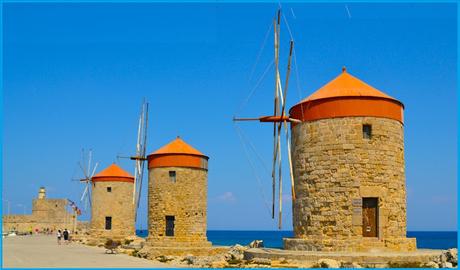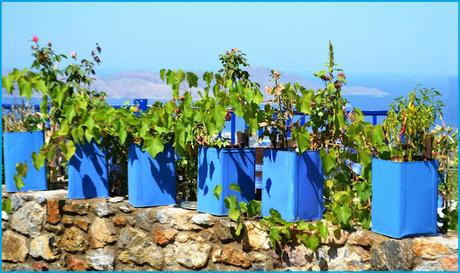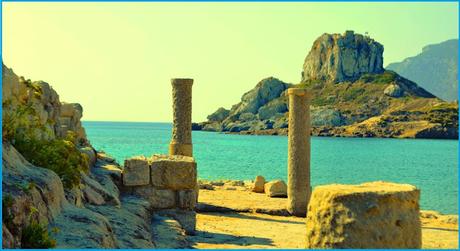Anyone who knows me, or has been reading these Saturday blogs, will realize I'm a true hellenophile, dictionary definition: "someone who has a love of Greece and/or Greek culture, either Ancient or Modern". I would add "or both". And by extension (because sentences can begin with and), hellenophilia encompasses the notion that the basis of western artistic, philosophical, political and scientific endeavours can be found in Ancient Greece.
I arrived there without travelling, so to speak, in my pre-teen years when I first read those splendid re-tellings for children of: Tales of the Greek Heroes, The Tale of Troy, Mystery at Mycenae, The Luck of Troy, all written by Roger Lancelyn Green in the late 1950s and published by Puffin Books. RLG was educated at Oxford where C.S. Lewis was his tutor. He was also a member of the Inklings group for a while (along with Coghill, Lewis, Tolkien and others). Those books were what sparked my lifelong fascination with all things Greek. I would have studied Greek at school in Cambridge if it had been on offer in the 1960s, but I had to make do with Latin (a poor second).

Cambridge possessed two very good Greek restaurants, Eros and the Varsity, very popular with students. I used to frequent them both when I was in the sixth form, with my girlfriend, with school mates or with colleagues from Cambridge Arts Theatre where I had a part-time job. Those restaurants gave me an abiding love of Greek cuisine.
When I went up to university to read English, one of our first year modules was the Greek classics: Homer's Iliad and Odyssey, the plays of Aeschylus, Agathon, Aristophanes, Euripides and Sophocles in particular. I was in my element - and still had never set foot in the country. Part of the reason was financial, obviously, but the more compelling reason was political, For Greece, the birthplace of democracy, had been rocked by a military coup in 1967 when the army deposed King Constantine and a military junta of the Generals took over the running of the country. It was unthinkable to travel to Greece in such circumstances; a boycott was in effect while the oppressive regime was in place.
Fortunately for Greece and everyone who wanted the best for that country, the military junta collapsed in 1974 (partly as a result of the Cyprus War between Greeks and Turks), and democratic elections were held to restore civil government. That was the change I'd been waiting for. Although tensions were still high in the area, my girlfriend and I booked flights, filled our backpacks and set off in the summer of 1974 for Crete, the first of many visits to that country. We traveled around the eastern half of the island, pitching our tent on beaches, in palm groves, in olive orchards. I won't dwell on it, because I've blogged about aspects of that holiday before, but it felt, in a curious way, like coming home..

I've been to Greece many times, with two wives (not together, obviously,) with my children, with other partners. I've traveled there on holiday and on business (to Kodak in Athens). I've been to a Greek wedding of friends (nothing like Mama Mia) and nearly moved there in 2013. Instead, I relocated to Blackpool.
I've spent time on most of the large islands (of which Greece has many) as well as the mainland, traveling by ferry, by car, by bus, by bicycle and on foot. For me, the climate, the scenery, the sense of history, the cuisine and the friendliness of the Greek people is unrivalled. I suppose it is my happy place. There is nothing finer than waking to another sparkling azure day, doing a bit of walking and sight-seeing in the morning before enjoying a Greek salad and a Mythos at lunchtime then heading to a beach to bathe and read through the afternoon.
I always pack Greek literature when I go, have re-read Iliad and Odyssey several times when abroad, along with those great plays both comic and tragic. And not just ancient works either, also the poems of Kavafis and Seferis,, novels by Kazantzakis and Ritsos and a series of contemporary Greek detective stories featuring Alex Mavros.
The evenings are for promenading, checking out an interesting place to eat, enjoying a good meal maybe to the accompaniment of rebetika (Greek folk music) and then taking a last walk along a beach to watch the sun slip spectacularly into the sea.
I'm already making plans to go back in late summer (early September misses the peak tourist season), maybe to an island not visited before - and there are several calling to me. I just need to renew my passport first, as it expires in July. That's what I'll be doing next week.

I've not had the time to write a new poem for today's blog. Instead, I offer you one by Lawrence Durrell. Those of you who've read My Family and Other Animals or watched The Durrells on television will know that Lawrence (Larry in the series), the eldest of Louisa Durrell's four children, was determined to be an author, and so it turned out. He remained in Greece when his family returned to England and established his reputation as a novelist, playwright, poet and travel writer. He journeyed all through the Greek islands over many years and wrote passionately about them in a series of best-selling travel books, all eminently readable and still in print today.
The poem I've chosen is about Ithaca, one of the Ionian islands, reputed to have been the home of Odysseus. In his travel book The Greek Islands, Durrell describes it as "reverberating with the Homeric legend, a delightfully bare and bony little place, with knobbly hills, covered in holm oak, which come smoothly down into tur sea, into deep water which is rich in fish." The poem goes much further in conveying a sense of what it was like to stand on the land that had once been home to one of Ancient Greece's greatest pirate kings.
On Ithaca Standing Tread softly, for here you standOn miracle ground, boy.A breath would cloud this water of glass,Honey, bush, berry and swallow.This rock, then, is more pastoral thanArcadia is, Illyria was.Here the cold spring lilts on sand.The temperature of the toadSwallowing under a stone whispers: 'Diamonds,Boy, diamonds, and juice of minerals!'Be a saint here, dig for foxes, and water,Mere water springs in the bones of the hands.
Turn from the hearth of the hero. Think:Other men have their emblems, I this:The heart's dark anvil and the crucifixAre one, have hammered and shall hammerA nail of flesh, me to an island cross,Where the kestrel's arrow falls only,The green sea licks. Lawrence Durrell, 1937By the way, all the photographs in this blog are from my camera roll. I use a Nikon D3100.ΕυχιĎ�ÎšĎƒĎ„ĎŽ γΚι τΡν ÎąÎ˝ÎŹÎłÎ˝Ď‰ĎƒÎˇ, S ;-) Email ThisBlogThis!Share to TwitterShare to Facebook
